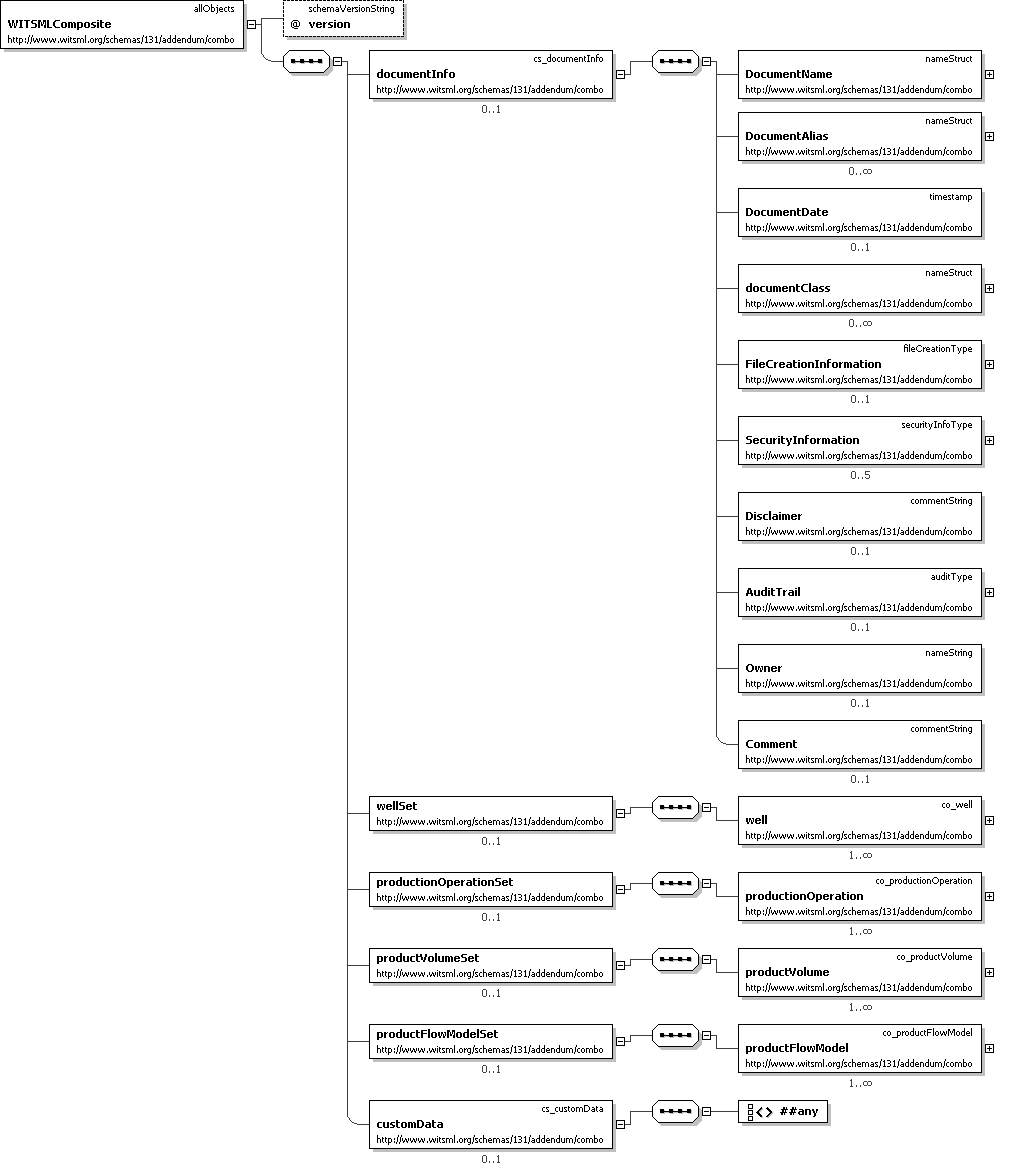
| Target Namespace | http://www.witsml.org/schemas/131/addendum/combo |
|---|---|
| Element and Attribute Namespaces |
|
| Schema Composition |
|
| Documentation | Copyright (c) 2005 Petrotechnical Open Standards Consortium, Inc (POSC). All rights reserved. POSC(r) is a registered trademark and WITSML(tm) is a trademark of POSC. |
| Prefix | Namespace |
|---|---|
| witsml | http://www.witsml.org/schemas/131/addendum/combo |
| xml | http://www.w3.org/XML/1998/namespace |
| xsd | http://www.w3.org/2001/XMLSchema |
| Name | WITSMLComposite |
|---|---|
| Type | witsml:allObjects |
| Nillable | no |
| Abstract | no |
| Documentation | The root container for all WITSML data. This schema is not designed for use with the WITSML API. Rather it captures the logical model represented by the API queriable objects. As such it can represent all data in a server or it can represent data outside the context of a server. The data in the API objects have been incorporated into a normal XML hierarchy of well/wellbore. The plural API root elements have essentially been renamed to "xxxSet". The content of the well and wellbore API objects has been captured in "generalInformation" elements. The realtime object is not included because it is considered to be a transient server concept. The trajectoryStation object is not included because it is redundant to the data in trajectory. |

'Data object schema version. The fourth level must match the version of the schema constraints (enumerations and XML loader files) that are assumed by the document instance.'
">'Information about the XML message instance.'
'A collector for production operation reports.'
'A production operation report.'
'A collector for product volume reports.'
'A single product volume report.'
'A collector for production flow models.'
'A single product flow model.'
'A container element that can contain custom or user defined data elements. This is intended for adding new objects that are not a child of well.'
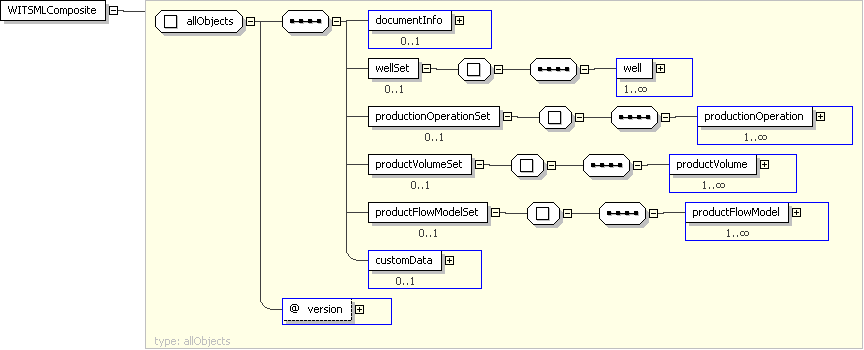
| Super-types: | None |
|---|---|
| Sub-types: | None |
| Name | allObjects |
|---|---|
| Used by (from the same schema document) | Element WITSMLComposite |
| Abstract | no |
'Data object schema version. The fourth level must match the version of the schema constraints (enumerations and XML loader files) that are assumed by the document instance.'
">'Information about the XML message instance.'
'A collector for production operation reports.'
'A production operation report.'
'A collector for product volume reports.'
'A single product volume report.'
'A collector for production flow models.'
'A single product flow model.'
'A container element that can contain custom or user defined data elements. This is intended for adding new objects that are not a child of well.'
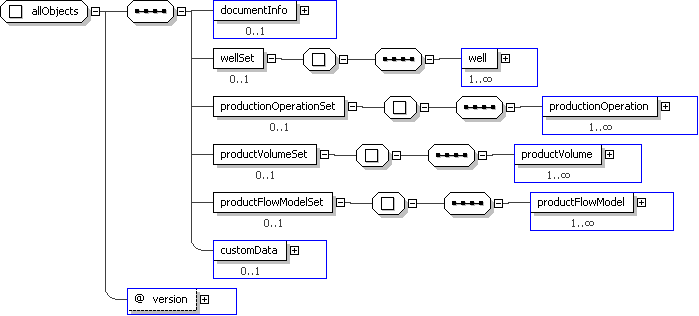
| Super-types: | None |
|---|---|
| Sub-types: | None |
| Name | co_completionString |
|---|---|
| Used by (from the same schema document) | Complex Type co_wellbore |
| Abstract | no |
'The unique identifier of a container element. This attribute is generally required within the context of a WITSML server. There should be no assumption as to the semantic content of this attribute. This should only be used with recurring container types (i.e., maxOccurs greater than one). The value is only required to be unique within the context of the nearest recurring parent element.'
">'Human recognizable context for the completion string.'
'The non-contextual content for a completion string.'
'The measured depth at the top.'
'The measured depth at the base.'
'The true vertical depth at the top.'
'The true vertical depth at the base.'
'The date and time at which the string was instlled.'
'These are the items of equipment that are commonly found in a completion string. MISSING ITEMS: power and gauge cable, capillary tube.'
'This is a rod string within a completion string. It is not defined how this rod string is connected to the prime mover at the surface. QUESTION: What about other pumping methods?'
'The effective length of the string.'
'The effective volume of the string.'
'xxxxxxxxxxxxxxxxxx'
'A collector for completion string classes.'
'A recording of a status associated with the string.'
'A container element that contains elements that are common to all data objects.'
'A container element that can contain custom or user defined data elements.'
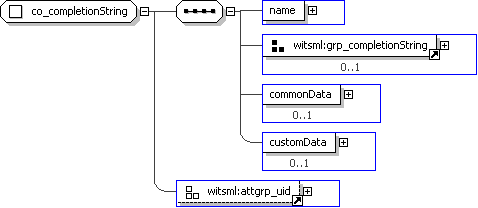
| Super-types: | None |
|---|---|
| Sub-types: | None |
| Name | co_productFlowModel |
|---|---|
| Used by (from the same schema document) | Complex Type allObjects |
| Abstract | no |
'The unique identifier of a container element. This attribute is generally required within the context of a WITSML server. There should be no assumption as to the semantic content of this attribute. This should only be used with recurring container types (i.e., maxOccurs greater than one). The value is only required to be unique within the context of the nearest recurring parent element.'
">'Human recognizable context for the Product Flow Model.'
'The non-contextual content for a Product Flow Model.'
'The name of the facility which is represented by this model. The name can be qualified by a naming system. This also defines the kind of facility.'
'The name and type of a facility whose context is relevant to the represented installation.'
'The date and time of the start of validity for this model.'
'The date and time of the termination of validity for this model.'
'Defines the external port in another Product Flow Model to which an external port in this model is connected. An external port should be connected to an external port with the opposite direction. The connected external port must be in another Product Flow Model. These connections should always be defined on a one-to-one basis. For example, if a facility may receive input from multiple other facilities then a separate input port should be defined for each of those facilities. This allows any question about mass balancing to be contained within each individual model. The external port name must match the name of an external port on the network that represents this model.'
'The description of one named network within this model. Each model is self contained but may reference other newtorks for defining internal detail. One of the networks must represent this model.'
'A descriptive remark about the model.'
'A container element that contains elements that are common to all data objects.'
'A container element that can contain custom or user defined data elements.'
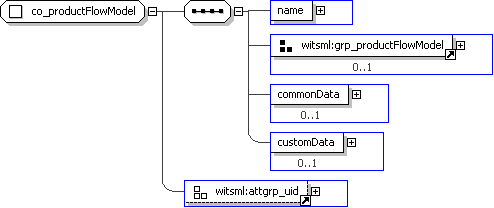
| Super-types: | None |
|---|---|
| Sub-types: | None |
| Name | co_productVolume |
|---|---|
| Used by (from the same schema document) | Complex Type allObjects |
| Abstract | no |
'The unique identifier of a container element. This attribute is generally required within the context of a WITSML server. There should be no assumption as to the semantic content of this attribute. This should only be used with recurring container types (i.e., maxOccurs greater than one). The value is only required to be unique within the context of the nearest recurring parent element.'
">'Human recognizable context for the Product Volume Report.'
'The non-contextual content for a product volume report.'
'The name of the facility which is represented by this report. The name can be qualified by a naming system. This also defines the kind of facility.'
'The name and type of a facility whose context is relevant to the represented installation.'
'The type of period that is being reported. This value must be consistent with the reporting start and end values.'
'The reporting period. If one value from a pair are given the both values must be given.'
'The beginning date and time that the report represents.'
'The ending date and time that the report represents.'
'The beginning date that the report represents.'
'The operator of the facilities in the report.'
'The tile of the report if different from the name of the report.'
'The geographic context of the report.'
'The person or company that issued the report. This may contain the role of the person or company within the context of the report.'
'The date that the report was approved.'
'The person or company that approved the report. This may contain the role of the person or company within the context of the report.'
'The Product Flow Model for the overall installation. This model represents all Product Flow Units referenced within this report.'
'Defines the standard temperature and pressure to which all standard volumes in this report have been corrected. This applies to all elements whose name is suffixed by Std and documented to be corrected to conditions of standard temperature and pressure.'
'A facility for which product information is being reported.'
'A container element that contains elements that are common to all data objects.'
'A container element that can contain custom or user defined data elements.'
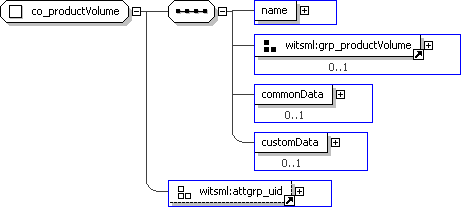
| Super-types: | None |
|---|---|
| Sub-types: | None |
| Name | co_productionOperation |
|---|---|
| Used by (from the same schema document) | Complex Type allObjects |
| Abstract | no |
'The unique identifier of a container element. This attribute is generally required within the context of a WITSML server. There should be no assumption as to the semantic content of this attribute. This should only be used with recurring container types (i.e., maxOccurs greater than one). The value is only required to be unique within the context of the nearest recurring parent element.'
">'Human recognizable context for the Production Operation Report.'
'The non-contextual content for a production operation report.'
'The name of the facility which is represented by this report. The name can be qualified by a naming system. This also defines the kind of facility.'
'The name and type of a facility whose context is relevant to the represented installation.'
'The type of period that is being reported. This value must be consistent with the reporting start and end values.'
'The reporting period. If one value from a pair are given the both values must be given.'
'The beginning date and time that the report represents.'
'The ending date and time that the report represents.'
'The beginning date that the report represents.'
'The operator of the facilities in the report.'
'The tile of the report if different from the name of the report.'
'The geographic context of the report.'
'The person or company that issued the report. This may contain the role of the person or company within the context of the report.'
'The date that the report was approved.'
'The person or company that approved the report. This may contain the role of the person or company within the context of the report.'
'A report for each installation'
'A container element that contains elements that are common to all data objects.'
'A container element that can contain custom or user defined data elements.'
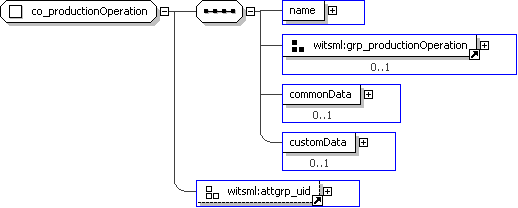
| Super-types: | None |
|---|---|
| Sub-types: | None |
| Name | co_well |
|---|---|
| Used by (from the same schema document) | Complex Type allObjects |
| Abstract | no |
'The unique identifier of a container element. This attribute is generally required within the context of a WITSML server. There should be no assumption as to the semantic content of this attribute. This should only be used with recurring container types (i.e., maxOccurs greater than one). The value is only required to be unique within the context of the nearest recurring parent element.'
">'General information about a well.'
'A collector for well completions.'
'A single well completion.'
'A container element that can contain custom or user defined data elements. This is intended for adding new custom objects that are a child of well.'
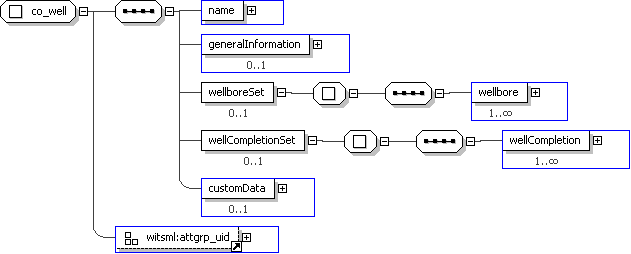
| Super-types: | None |
|---|---|
| Sub-types: | None |
| Name | co_wellCompletion |
|---|---|
| Used by (from the same schema document) | Complex Type co_well |
| Abstract | no |
'The unique identifier of a container element. This attribute is generally required within the context of a WITSML server. There should be no assumption as to the semantic content of this attribute. This should only be used with recurring container types (i.e., maxOccurs greater than one). The value is only required to be unique within the context of the nearest recurring parent element.'
">'Human recognizable context for the well completion.'
'The non-contextual content for a well completion.'
'The date when the completion is first operational.'
'The date when the completion is no longer operational.'
'The date when the completion was finished.'
'The recording of a status associated with the completion.'
'The ratio of flow rate to pressure drop. Used for oil wells, PI is the barrels of oil produced per day per psi decline in bottomhole flowing pressure.'
'The term that accounts for additional pressure drops in the immediate vicinity of a well in well performance calculations, such as transient pressure test analysis. Positive skin effects indicate damaged conditions. Negative skin effects indicate stimulated conditions.'
'A pointer to to the completion string utilized by this well completion.'
'A pointer to a wellbore open hole interval that is part of the well completion.'
'A pointer to a wellbore perforation interval that is part of the well completion.'
'A container element that contains elements that are common to all data objects.'
'A container element that can contain custom or user defined data elements.'
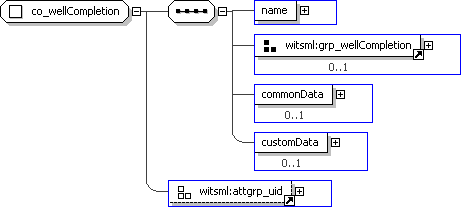
| Super-types: | None |
|---|---|
| Sub-types: | None |
| Name | co_wellHeader |
|---|---|
| Used by (from the same schema document) | Complex Type co_well |
| Abstract | no |
'The non-contextual general information for a well.'
'Date and time license was issued.'
'Name of the field in which the well is located.'
'The time zone in which well is located. It is the deviation in hours and minutes from UTC. This should be the normal time zone at the well and not a seasonally adjusted value such as daylight savings time. While the time zone is optional in a date time value, it is strongly advised that the zone always be specified in each date time value. The time zone in a date time value may use seasonally adjusted values.'
'Interest for Operator. Commonly in percent.'
'POSC well fluid. The type of fluid being produced from or injected into a well facility.'
'POSC well direction. The direction of flow of the fluids in a well facility (generally, injected or produced, or some combination).'
'Date and time at which well was spudded.'
'Date and time at which well was plugged and abandoned.'
'Elevation of wellhead relative to a wellDatum.'
'A datum to which elevations and depths are referenced.'
'Elevation of ground level (land rigs).'
'Depth of water (not land rigs).'
'the 2D coordinates of the well surface point in one coordinate reference system. This is where the well crosses ground level on land and crosses the platform offshore.'
'Defines a reference point within the context of the well.'
'A coordinate reference system that was used within the context of this well.'
'A container element that contains elements that are common to all data objects.'
'A container element that can contain custom or user defined data elements.'
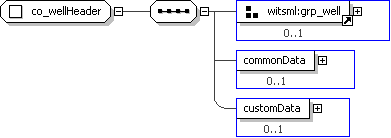
| Super-types: | None |
|---|---|
| Sub-types: | None |
| Name | co_wellTest |
|---|---|
| Used by (from the same schema document) | Complex Type co_wellbore |
| Abstract | no |
'The unique identifier of a container element. This attribute is generally required within the context of a WITSML server. There should be no assumption as to the semantic content of this attribute. This should only be used with recurring container types (i.e., maxOccurs greater than one). The value is only required to be unique within the context of the nearest recurring parent element.'
">'The non-contextual content for a well test.'
'The date-time of the previous well test.'
'The date-time of the last valid well test.'
'The reason for the well test: initial, periodic, revision.'
'The size of the opening in the flow choke at the wellhead.'
'A port on a Product Flow Unit that is represented by this test.'
'The Product Flow Unit represented by the port. This is defined within the Product Flow Model'
'The Product Flow Model that represents the above Product Flow Unit.'
'Defines the standard temperature and pressure to which all standard volumes in this report have been corrected. This applies to all elements whose name is suffixed by StdTempPres.'
'Data from a fluid level test.'
'Data from a production test.'
'Data from an injection test.'
'A container element that contains elements that are common to all data objects.'
'A container element that can contain custom or user defined data elements.'
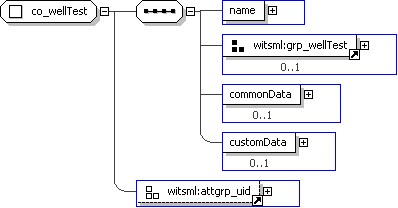
| Super-types: | None |
|---|---|
| Sub-types: | None |
| Name | co_wellbore |
|---|---|
| Used by (from the same schema document) | Complex Type co_well |
| Abstract | no |
'The unique identifier of a container element. This attribute is generally required within the context of a WITSML server. There should be no assumption as to the semantic content of this attribute. This should only be used with recurring container types (i.e., maxOccurs greater than one). The value is only required to be unique within the context of the nearest recurring parent element.'
">'General information about a wellbore.'
'A collector for completion strings.'
'A single completion string.'
'A collector for wellbore intervals.'
'A single wellbore interval.'
'A container element that can contain custom or user defined data elements. This is intended for adding new objects that are a child of wellbore.'
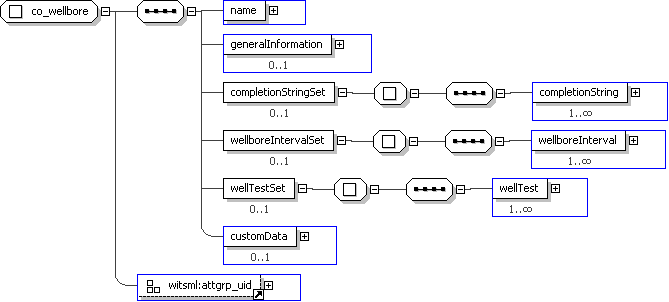
| Super-types: | None |
|---|---|
| Sub-types: | None |
| Name | co_wellboreHeader |
|---|---|
| Used by (from the same schema document) | Complex Type co_wellbore |
| Abstract | no |
'The non-contextual general information for a wellbore.'
'This is a pointer to the parent wellbore. No parent = starts from top.'
'POSC wellbore purpose.'
'Date and time of wellbore kickoff.'
'True (\"true\" of \"1\") indicates that the wellbore has acheieved total depth. That is, drilling has completed. False (\"false\" or \"0\") indicates otherwise. Not given indicates that it is not known whether total depth has been reached.'
'The current measured depth of the borehole. If status is plugged, indicates the maximum depth reached before plugging.'
'The current true vertical depth of the borehole. If status is plugged, indicates the maximum depth reached before plugging.'
'Kickoff measured depth of the wellbore.'
'Kickoff true vertical depth of the wellbore.'
'Planned measured depth for the wellbore total depth.'
'Planned true vertical depth for the wellbore total depth.'
'Planned measured for the wellbore total depth - with respect to seabed.'
'Planned true vertical depth for the wellbore total depth - with respect to seabed.'
'Target days for drilling wellbore.'
'A container element that contains elements that are common to all data objects.'
'A container element that can contain custom or user defined data elements.'

| Super-types: | None |
|---|---|
| Sub-types: | None |
| Name | co_wellboreInterval |
|---|---|
| Used by (from the same schema document) | Complex Type co_wellbore |
| Abstract | no |
'The unique identifier of a container element. This attribute is generally required within the context of a WITSML server. There should be no assumption as to the semantic content of this attribute. This should only be used with recurring container types (i.e., maxOccurs greater than one). The value is only required to be unique within the context of the nearest recurring parent element.'
">'Human recognizable context for the wellbore interval.'
'The non-contextual content for a wellbore interval.'
'The date and time when the interval was created.'
'The measured depth at the top of the interval.'
'The measured depth at the base of the interval.'
'The true vertical depth at the top of the interval.'
'The true vertical depth at the base of the interval.'
'A description of the perforations in this interval.'
'Commonly specified for fraced intervals.'
'A description of a single fracturing stage.'
'A recording of a status with regard to the interval'
'A textual remark about the interval.'
'A container element that contains elements that are common to all data objects.'
'A container element that can contain custom or user defined data elements.'
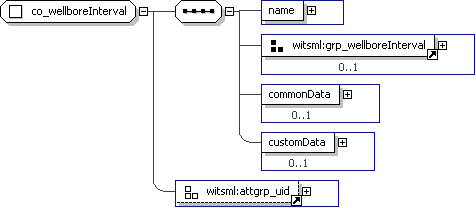
| Super-types: | Address < AusAddress (by extension) |
|---|---|
| Sub-types: |
|
| Name | AusAddress |
|---|---|
| Abstract | no |
The XML Instance Representation table above shows the schema component's content as an XML instance.
Abstract (Applies to complex type definitions and element declarations). An abstract element or complex type cannot used to validate an element instance. If there is a reference to an abstract element, only element declarations that can substitute the abstract element can be used to validate the instance. For references to abstract type definitions, only derived types can be used.
All Model Group Child elements can be provided in any order in instances. See: http://www.w3.org/TR/xmlschema-1/#element-all.
Choice Model Group Only one from the list of child elements and model groups can be provided in instances. See: http://www.w3.org/TR/xmlschema-1/#element-choice.
Collapse Whitespace Policy Replace tab, line feed, and carriage return characters with space character (Unicode character 32). Then, collapse contiguous sequences of space characters into single space character, and remove leading and trailing space characters.
Disallowed Substitutions
(Applies to element declarations). If substitution is specified, then substitution group members cannot be used in place of the given element declaration to validate element instances. If derivation methods, e.g. extension, restriction, are specified, then the given element declaration will not validate element instances that have types derived from the element declaration's type using the specified derivation methods. Normally, element instances can override their declaration's type by specifying an xsi:type attribute.
Key Constraint Like Uniqueness Constraint, but additionally requires that the specified value(s) must be provided. See: http://www.w3.org/TR/xmlschema-1/#cIdentity-constraint_Definitions.
Key Reference Constraint Ensures that the specified value(s) must match value(s) from a Key Constraint or Uniqueness Constraint. See: http://www.w3.org/TR/xmlschema-1/#cIdentity-constraint_Definitions.
Model Group Groups together element content, specifying the order in which the element content can occur and the number of times the group of element content may be repeated. See: http://www.w3.org/TR/xmlschema-1/#Model_Groups.
Nillable
(Applies to element declarations). If an element declaration is nillable, instances can use the xsi:nil attribute. The xsi:nil attribute is the boolean attribute, nil, from the http://www.w3.org/2001/XMLSchema-instance namespace. If an element instance has an xsi:nil attribute set to true, it can be left empty, even though its element declaration may have required content.
Notation A notation is used to identify the format of a piece of data. Values of elements and attributes that are of type, NOTATION, must come from the names of declared notations. See: http://www.w3.org/TR/xmlschema-1/#cNotation_Declarations.
Preserve Whitespace Policy Preserve whitespaces exactly as they appear in instances.
Prohibited Derivations (Applies to type definitions). Derivation methods that cannot be used to create sub-types from a given type definition.
Prohibited Substitutions (Applies to complex type definitions). Prevents sub-types that have been derived using the specified derivation methods from validating element instances in place of the given type definition.
Replace Whitespace Policy Replace tab, line feed, and carriage return characters with space character (Unicode character 32).
Sequence Model Group Child elements and model groups must be provided in the specified order in instances. See: http://www.w3.org/TR/xmlschema-1/#element-sequence.
Substitution Group Elements that are members of a substitution group can be used wherever the head element of the substitution group is referenced.
Substitution Group Exclusions (Applies to element declarations). Prohibits element declarations from nominating themselves as being able to substitute a given element declaration, if they have types that are derived from the original element's type using the specified derivation methods.
Target Namespace The target namespace identifies the namespace that components in this schema belongs to. If no target namespace is provided, then the schema components do not belong to any namespace.
Uniqueness Constraint Ensures uniqueness of an element/attribute value, or a combination of values, within a specified scope. See: http://www.w3.org/TR/xmlschema-1/#cIdentity-constraint_Definitions.